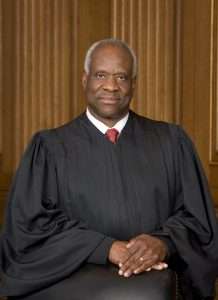The Volokh Conspiracy
Mostly law professors | Sometimes contrarian | Often libertarian | Always independent
Today in Supreme Court History: October 23, 1991
10/23/1991: Justice Clarence Thomas takes oath.

Editor's Note: We invite comments and request that they be civil and on-topic. We do not moderate or assume any responsibility for comments, which are owned by the readers who post them. Comments do not represent the views of Reason.com or Reason Foundation. We reserve the right to delete any comment for any reason at any time. Comments may only be edited within 5 minutes of posting. Report abuses.
Please to post comments


INS v. Hibi, 414 U.S. 5 (decided October 23, 1973): application for citizenship by Philippines-born veteran who fought there and was imprisoned there by the Japanese denied because the Nationality Act of 1940, which made citizenship available for any non-citizen who served honorably in World War II, set a deadline of 12/31/46 for applications, even though Nationality Act provisions were never publicized in the Philippines and there was no office there where one could apply (Hibi didn't apply for citizenship until he moved to the United States in 1964); no equitable tolling because no "affirmative misconduct" by Government (Douglas, Brennan and Marshall dissent)
Beecher v. Alabama, 389 U.S. 35 (decided October 23, 1967): confession by black defendant as rape-murder of white woman when in hospital recovering from police gunshot wounds and under the influence of painkillers was not voluntarily made (defendant had already made a confession, but it was at gunpoint at the scene)
Bacon v. Rives, 106 U.S. 99 (decided October 23, 1882): diversity jurisdiction exists where "real party in interest" defendant (executor who made off with estate funds) is out of state even when nominal defendants (co-executors who had an interest in the dispute) are in-state
Interesting that "real party in interest" was a thing back in 1882. I thought that concept was introduced with the new rules of civil procedure in the 20th century.
The phrase is my own. I should not have put it in quotes. Though in other cases the Court used the phrase as early as 1823 (Childress v. Emory, 21 U.S. 642).
"the Nationality Act of 1940, which made citizenship available for any non-citizen who served honorably in World War II"
In 1940, the U. S. government was not officially committed to getting into WWII, so I would imagine the law wasn't phrased that specifically.
It was actually the "Nationality Act of 1940 (as amended)"